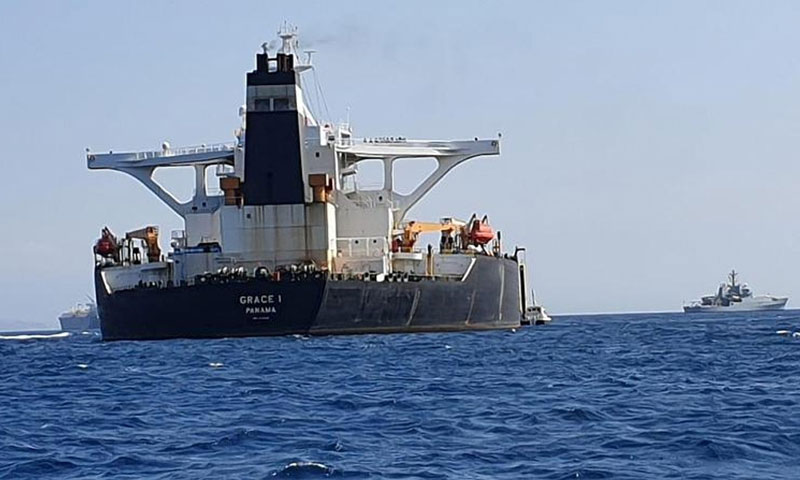



The European and American sanctions blocked the sea lane passages on Iranian vessels, heading to Syria, in a move to impose economic sanctions on the Syrian regime.
After Britain’s seizure of oil supertanker Grace 1 in Gibraltar on 4 July, 2019, Iran has lost access to the second strategic sea lane to Syria; Iranian vessels were already prevented to transit through the Suez Canal.
The decision of detaining the Iranian vessel came at the request of Washington. The Spanish Foreign Minister, Josep Borrell said: “Spain is looking into how seizing the tanker affects Spanish sovereignty, for as it seems the seizure has happened [in Spanish regional waters],” Reuters reported.
Fabino Picardo, chief minister of Gibraltar(British overseas territory) said: ” We have reason to believe that the Grace 1 was carrying its shipments of crude oil to the Baniyas Refinery in Syria,” cited by France Press agency.
Iran has two sea routes to reach the Syrian coast: The first route crosses the Arabian Gulf’s Arabian Sea and Red Sea; it then passes through the Suez Canal to the Mediterranean Sea, to finally duck at a Syrian port. The second route goes through the African waters, circles Africa, reaches the Mediterranean Sea through the Strait of Gibraltar and this route’s sailing distance is four times the distance of the route going through the strait of Gibraltar. In fact, the estimated distance of the route that goes through the Suez Canal is around 5,000 kilometers, while the route’s distance circling Africa and passing through Gibraltar is estimated to be more than 20,000 kilometers. However, after restricting Iran’s ability to move oil in the Suez Canal, Iran used the second route to end up exactly in the same situation by impounding the 1 Grace supertanker off Gibraltar.
A maritime intelligence source told Reuters the following: “The ship may have made the journey around Africa to avoid the Suez Canal, where such a large super-tanker would have had to unload its cargo and refill, exposing itself to potential seizure.”
Lloyd’s list maritime affairs specialists reported that the Grace 1 was carrying Iranian oil, citing that Iran’s Automatic Identification Signal was turned off to hide its location off the Iranian coast.
Rifinitiv, a global provider of financial markets data and infrastructure, mentioned that the tanker loading a 2million- barrel cargo had taken a route of 90 days around Africa to reach the Mediterranean Sea.
The seizure of the Iranian oil tanker Grace 1 has led to divergent positions in the international community. The United States welcomed Britain’s seizing of the Iranian oil supertanker Grace 1 via the U.S. national security adviser John Bolton who said on Twitter “America & our allies will continue to prevent regimes in Tehran & Damascus from profiting off this illicit trade,” indicating that the British move was “excellent news.” This was followed by UK Foreign Secretary Jeremy Hunt’s comment on Twitter, “congratulations to Gibraltar & Royal Marines for this bold move to enforce Syria sanctions. Their swift action has denied valuable resources to Asad’s murderous regime.”
However, Iran and its ally Russia have denounced the 330-meter ship seizure and summoned the British ambassador to voice “ its very strong objection to the illegal and unacceptable seizure” of its ship. Revolutionary Guards Major General Mohsen Rezai said on Twitter, “if Britain does not release the Iranian oil tanker, it is the authorities duty to seize a British oil tanker.” Additionally, the Russian Foreign Ministry pointed out that the consequence of the Iranian oil tanker’s seizure in the Strait of Gibraltar “could be disastrous,” stating that “we view the seizure of the vessel and its cargo as a deliberate action aimed at aggravating the situation around Iran and Syria. Laudatory comments by top U.S. and British officials immediately after the operation confirm this conclusion and prove that the action had been long in the making with the involvement of respective services and agencies of several countries.”
Plus, the statement of the Russian Foreign Ministry added: “This action contradicts the willingness of the leading countries to keep the nuclear agreement with Iran. […] the consequences could be catastrophic and the whole responsibility will be the countries’ pressuring Tehran and Damascus in violation of UN Security Council resolutions 2231 and 2254. The rising tensions between Washington and Tehran could affect the EU’s trial to still be committed to the Iranian nuclear deal after Washington’s withdrawal from it.
if you think the article contain wrong information or you have additional details Send Correction